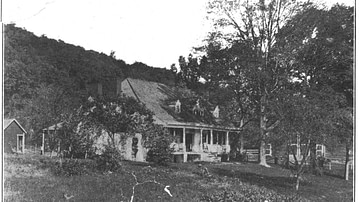Sojourner Truth's Escape from Slavery comes from the Narrative of Sojourner Truth, an account of the famous abolitionist's life as given to her friend and admirer Olive Gilbert and published in 1850. The story of her "walking away" from slavery is among the most famous slave narratives of 19th-century America.

Sojourner Truth (l. c. 1797-1883) was born a slave in Swartekill (near present-day Town of Esopus, New York, USA), which was originally settled by the Dutch in the 17th century. Truth was given the name Isabella Bomefree (also given as Baumfree) at birth and changed her name to Sojourner Truth in 1843 after she claimed to have heard the Holy Spirit telling her to "preach truth." Her first language was Dutch, which would later lead to difficulties with the wife of her master, John Nealy of Ulster County, NY, who only knew English.
As a young girl, she (like many other slaves) was brought up with the understanding given in Ephesians 6:5 of the Bible: "Slaves, obey your earthly masters with respect and fear, and with sincerity of heart, just as you would obey Christ." When she finally decided to leave her master, she later famously said: "I did not run off, for I thought that wicked, but I walked off, believing that to be all right" (Delbanco, 142).
Sojourner Truth walked away from slavery to become one of the most famous advocates for the abolition of slavery, women's suffrage, and human rights in US history and is honored today with monuments, place names, scholarships, and statuary throughout the United States.
Text
The following is taken from the early chapters of Narrative of Sojourner Truth (1850) as told to Olive Gilbert (as Truth was illiterate). The narrative is among the most historically important, documenting slavery in the North, in New York State, as US slavery is usually associated with the Southern states. Truth is identified as "Isabella" throughout:
At this memorable time, Isabella was struck off, for the sum of one hundred dollars, to one John Nealy, of Ulster County, New York; and she has an impression that in this sale she was connected with a lot of sheep. She was now nine years of age, and her trials in life may be dated from this period.
She says, with emphasis, 'Now the war begun.' She could only talk Dutch-and the Nealys could only talk English. Mr. Nealy could understand Dutch, but Isabel and her mistress could neither of them understand the language of the other-and this, of itself, was a formidable obstacle in the way of a good understanding between them, and for some time was a fruitful source of dissatisfaction to the mistress, and of punishment and suffering to Isabella.
She says, 'If they sent me for a frying-pan, not knowing what they meant, perhaps I carried them pot-hooks and trammels. Then, oh! how angry mistress would be with me!' Then she suffered 'terribly-terribly', with the cold. During the winter her feet were badly frozen, for want of proper covering. They gave her a plenty to eat, and also a plenty of whippings.
One Sunday morning, in particular, she was told to go to the barn; on going there, she found her master with a bundle of rods, prepared in the embers, and bound together with cords. When he had tied her hands together before her, he gave her the most cruel whipping she was ever tortured with. He whipped her till the flesh was deeply lacerated, and the blood streamed from her wounds-and the scars remain to the present day, to testify to the fact. 'And now,' she says, 'when I hear 'em tell of whipping women on the bare flesh, it makes my flesh crawl, and my very hair rise on my head! Oh! my God!' she continues, 'what a way is this of treating human beings?'
In those hours of her extremity, she did not forget the instructions of her mother, to go to God in all her trials, and every affliction; and she not only remembered, but obeyed: going to him, 'and telling him all-and asking Him if He thought it was right,' and begging him to protect and shield her from her persecutors.
She always asked with an unwavering faith that she should receive just what she pleaded for, -'And now,' she says, 'though it seems curious, I do not remember ever asking for anything but what I got it. And I always received it as an answer to my prayers. When I got beaten, I never knew it long enough to go beforehand to pray; and I always thought that if I only had had time to pray to God for help, I should have escaped the beating.'
She had no idea God had any knowledge of her thoughts, save what she told him; or heard her prayers, unless they were spoken audibly. And consequently, she could not pray unless she had time and opportunity to go by herself, where she could talk to God without being overheard.
When she had been at Mr. Nealy's several months, she began to beg God most earnestly to send her father to her, and as soon as she commenced to pray, she began as confidently to look for his coming, and, ere it was long, to her great joy, he came. She had no opportunity to speak to him of the troubles that weighed so heavily on her spirit, while he remained; but when he left, she followed him to the gate, and unburdened her heart to him, inquiring if he could not do something to get her a new and better place.
In this way the slaves often assist each other, by ascertaining who are kind to their slaves, comparatively; and then using their influence to get such an one to hire or buy their friends; and masters, often from policy, as well as from latent humanity, allow those they are about to sell or let, to choose their own places, if the persons they happen to select for masters are considered safe pay.
He promised to do all he could, and they parted. But, every day, as long as the snow lasted, (for there was snow on the ground at the time,) she returned to the spot where they separated, and walking in the tracks her father had made in the snow, repeated her prayer that 'God would help her father get her a new and better place.'
A long time had not elapsed, when a fisherman by the name of Scriver appeared at Mr. Nealy's and inquired of Isabel 'if she would like to go and live with him.' She eagerly answered 'Yes,' and nothing doubting but he was sent in answer to her prayer; and she soon started off with him, walking while he rode; for he had bought her at the suggestion of her father, paying one hundred and five dollars for her. He also lived in Ulster County, but some five or six miles from Mr. Nealy's.
Scriver, besides being a fisherman, kept a tavern for the accommodation of people of his own class-for his was a rude, uneducated family, exceedingly profane in their language, but, on the whole, an honest, kind and well-disposed people.
They owned a large farm, but left it wholly unimproved, attending mainly to their vocations of fishing and inn-keeping. Isabella declares she can ill describe the kind of life she led with them. It was a wild, out-of-door kind of life. She was expected to carry fish, to hoe corn, to bring roots and herbs from the woods for beers, go to the Strand for a gallon of molasses or liquor as the case might require, and 'browse around,' as she expresses it.
It was a life that suited her well for the time-being as devoid of hardship or terror as it was of improvement; a need which had not yet become a want. Instead of improving at this place, morally, she retrograded, as their example taught her to curse; and it was here that she took her first oath. After living with them for about a year and a half, she was sold to one John J. Dumont, for the sum of seventy pounds. This was in 1810. Mr. Dumont lived in the same county as her former masters, in the town of New Paltz, and she remained with him till a short time previous to her emancipation by the State, in 1828.
After emancipation had been decreed by the State, some years before the time fixed for its consummation, Isabella's master told her if she would do well, and be faithful, he would give her 'free papers,' one year before she was legally free by statute. In the year 1826, she had a badly diseased hand, which greatly diminished her usefulness; but on the arrival of July 4, 1827, the time specified for her receiving her 'free papers,' she claimed the fulfilment of her master's promise; but he refused granting it, on account (as he alleged) of the loss he had sustained by her hand.
She plead that she had worked all the time and done many things she was not wholly able to do, although she knew she had been less useful than formerly; but her master remained inflexible. Her very faithfulness probably operated against her now, and he found it less easy than he thought to give up the profits of his faithful Bell, who had so long done him efficient service.
But Isabella inwardly determined that she would remain quietly with him only until she had spun his wool-about one hundred pounds-and then she would leave him, taking the rest of the time to herself. 'Ah!' she says, with emphasis that cannot be written, 'the slaveholders are TERRIBLE for promising to give you this or that, or such and such a privilege, if you will do thus and so; and when the time of fulfilment comes, and one claims the promise, they, forsooth, recollect nothing of the kind: and you are, like as not, taunted with being a LIAR; or, at best, the slave is accused of not having performed his part or condition of the contract.'
'Oh!' said she, 'I have felt as if I could not live through the operation sometimes. Just think of us! so eager for our pleasures, and just foolish enough to keep feeding and feeding ourselves up with the idea that we should get what had been thus fairly promised; and when we think it is almost in our hands, find ourselves flatly denied! Just think! how could we bear it?
Why, there was Charles Brodhead promised his slave Ned, that when harvesting was over, he might go and see his wife, who lived some twenty or thirty miles off. So, Ned worked early and late, and as soon as the harvest was all in, he claimed the promised boon. His master said, he had merely told him he 'would see if he could go, when the harvest was over; but now he saw that he could not go.' But Ned, who still claimed a positive promise, on which he had fully depended, went on cleaning his shoes. His master asked him if he intended going, and on his replying 'yes,' took up a sled-stick that lay near him and gave him such a blow on the head as broke his skull, killing him dead on the spot.
The poor colored people all felt struck down by the blow.' Ah! and well they might. Yet it was but one of a long series of bloody, and other most effectual blows, struck against their liberty and their lives…
The subject of this narrative was to have been free July 4, 1827, but she continued with her master till the wool was spun, and the heaviest of the 'fall's work' closed up, when she concluded to take her freedom into her own hands and seek her fortune in some other place.
The question in her mind, and one not easily solved, now was, 'How can I get away?' So, as was her usual custom, she 'told God she was afraid to go in the night, and in the day, everybody would see her.' At length, the thought came to her that she could leave just before the day dawned and get out of the neighborhood where she was known before the people were much astir.
'Yes,' said she, fervently, 'that's a good thought! Thank you, God, for that thought!' So, receiving it as coming direct from God, she acted upon it, and one fine morning, a little before daybreak, she might have been seen stepping stealthily away from the rear of Master Dumont's house, her infant on one arm and her wardrobe on the other; the bulk and weight of which, probably, she never found so convenient as on the present occasion, a cotton handkerchief containing both her clothes and her provisions.
As she gained the summit of a high hill, a considerable distance from her master's, the sun offended her by coming forth in all his pristine splendor. She thought it never was so light before; indeed, she thought it much too light. She stopped to look about her and ascertain if her pursuers were yet in sight. No one appeared, and, for the first time, the question came up for settlement, 'Where, and to whom, shall I go?' In all her thoughts of getting away, she had not once asked herself whither she should direct her steps.
She sat down, fed her infant, and again turning her thoughts to God, her only help, she prayed him to direct her to some safe asylum. And soon it occurred to her, that there was a man living somewhere in the direction she had been pursuing, by the name of Levi Rowe, whom she had known, and who, she thought, would be likely to befriend her. She accordingly pursued her way to his house, where she found him ready to entertain and assist her, though he was then on his deathbed. He bade her partake of the hospitalities of his house, said he knew of two good places where she might get in, and requested his wife to show her where they were to be found.
As soon as she came in sight of the first house, she recollected having seen it and its inhabitants before, and instantly exclaimed, 'That's the place for me; I shall stop there.' She went there, and found the good people of the house, Mr. and Mrs. Van Wagener, absent, but was kindly received and hospitably entertained by their excellent mother, till the return of her children. When they arrived, she made her case known to them. They listened to her story, assuring her they never turned the needy away, and willingly gave her employment.
She had not been there long before her old master, Dumont, appeared, as she had anticipated; for when she took French leave of him, she resolved not to go too far from him, and not put him to as much trouble in looking her up-for the latter he was sure to do-as Tom and Jack had done when they ran away from him, a short time before. This was very considerate in her, to say the least, and a proof that 'like begets like.' He had often considered her feelings, though not always, and she was equally considerate.
When her master saw her, he said, 'Well, Bell, so you've run away from me.' 'No, I did not run away; I walked away by day-light, and all because you had promised me a year of my time.' His reply was, 'You must go back with me.' Her decisive answer was, 'No, I won't go back with you.' He said, 'Well, I shall take the child.' This also was as stoutly negatived.
Mr. Isaac S. Van Wagener then interposed, saying, he had never been in the practice of buying and selling slaves; he did not believe in slavery; but rather than have Isabella taken back by force, he would buy her services for the balance of the year-for which her master charged twenty dollars, and five in addition for the child. The sum was paid, and her master Dumont departed; but not till he had heard Mr. Van Wagener tell her not to call him master-adding, 'there is but one master; and he who is your master is my master.' Isabella inquired what she should call him? He answered, 'call me Isaac Van Wagener, and my wife is Maria Van Wagener.'
Isabella could not understand this, and thought it a mighty change, as it most truly was from a master whose word was law, to simple Isaac S. Van Wagener, who was master to no one. With these noble people, who, though they could not be the masters of slaves, were undoubtedly a portion of God's nobility, she resided one year, and from them she derived the name of Van Wagener; he being her last master in the eye of the law, and a slave's surname is ever the same as his master; that is, if he is allowed to have any other name than Tom, Jack, or Guffin. Slaves have sometimes been severely punished for adding their master's name to their own. But when they have no particular title to it, it is no particular offence.





